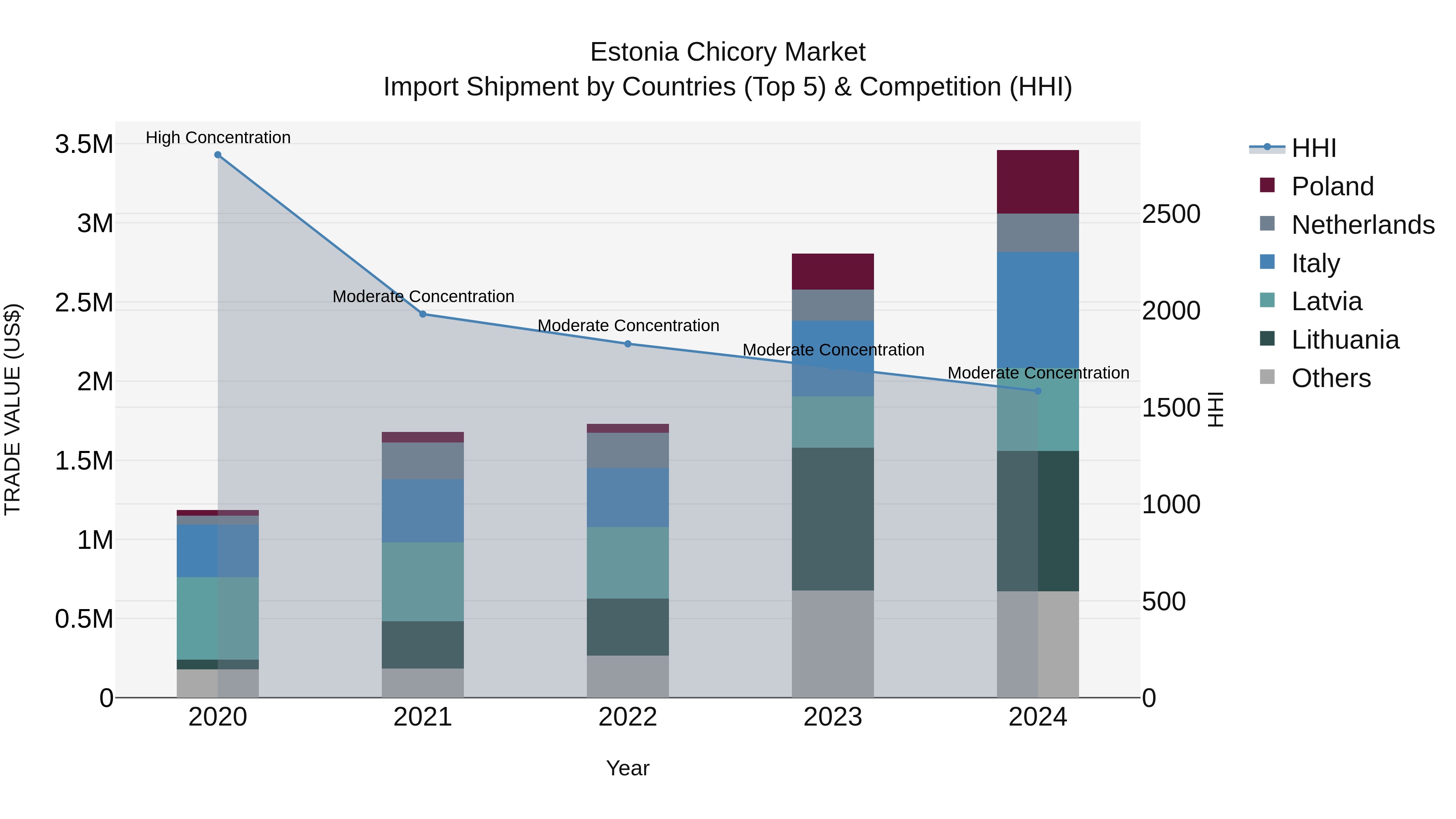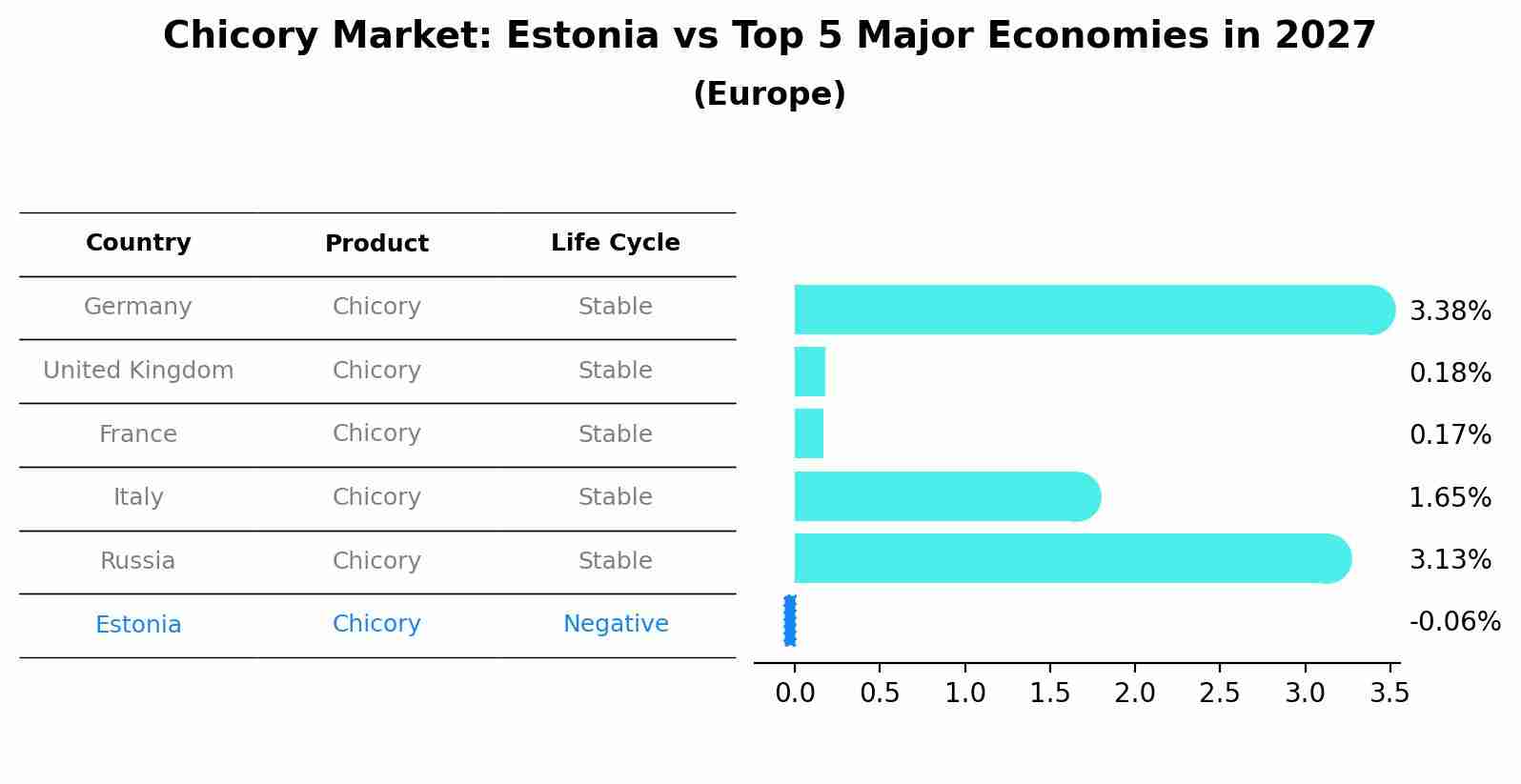Estonia Chicory Market (2025-2031) | Growth, Revenue, Companies, Segmentation, Analysis, Size, Forecast, Trends, Value, Outlook, Share & Industry
| Product Code: ETC4838971 | Publication Date: Nov 2023 | Updated Date: Nov 2025 | Product Type: Market Research Report | |
| Publisher: 6Wresearch | Author: Sachin Kumar Rai | No. of Pages: 60 | No. of Figures: 30 | No. of Tables: 5 |
Estonia Chicory Market Top 5 Importing Countries and Market Competition (HHI) Analysis
Estonia`s chicory import market saw notable growth in 2024, with key suppliers including Lithuania, Italy, Latvia, Poland, and the Netherlands. The market remained moderately concentrated, indicating a competitive landscape. The impressive compound annual growth rate (CAGR) of 30.67% from 2020 to 2024 highlights the increasing demand for chicory in Estonia. Furthermore, the growth rate of 23.3% in 2024 alone demonstrates the ongoing expansion and opportunities in this sector. Estonia`s chicory import market presents a promising outlook for both domestic consumption and potential business partnerships with top exporting countries.

Chicory Market: Estonia vs Top 5 Major Economies in 2027 (Europe)
The Chicory market in Estonia is projected to grow at a negative growth rate of -0.06% by 2027, highlighting the country's increasing focus on advanced technologies within the Europe region, where Germany holds the dominant position, followed closely by United Kingdom, France, Italy and Russia, shaping overall regional demand.

Estonia Chicory Market Overview
Chicory, used as a coffee substitute and functional food ingredient, is gaining popularity in Estonia for its health benefits, particularly in promoting digestive health.
Drivers of the market
The Chicory market in Estonia is growing as demand for natural and healthy food ingredients rises. Chicory is widely used in food products such as coffee substitutes, dietary supplements, and as a source of inulin, a prebiotic fiber. As consumers increasingly seek plant-based, low-calorie alternatives to traditional ingredients, chicory is gaining popularity. The growing interest in functional foods, along with the trend toward healthier diets, is fueling the expansion of the chicory market in Estonia. Additionally, the increased use of chicory in animal feed and other industrial applications contributes to the market`s growth.
Challenges of the market
The chicory market in Estonia faces challenges related to supply chain disruptions and market demand fluctuations. Chicory is used in food and beverage products, as well as for medicinal purposes, but its availability is highly dependent on agricultural conditions. Weather variations, pests, and diseases can disrupt crop yields, making the supply of chicory inconsistent. Moreover, as consumers increasingly turn to plant-based and functional foods, the market faces competition from other natural ingredients that may offer similar health benefits, such as turmeric or ginger, creating a challenge for chicory producers in maintaining their market share.
Government Policy of the market
Estonias government promotes the chicory market as part of its agricultural diversification efforts. Policies encourage the cultivation of chicory as an alternative crop, especially in areas with suitable growing conditions. Support is provided through EU agricultural subsidies for farmers cultivating chicory for both food and medicinal purposes. Additionally, Estonia promotes the processing of chicory into value-added products, such as chicory root extracts and coffee substitutes, by offering grants for innovation and eco-friendly production processes.
Key Highlights of the Report:
- Estonia Chicory Market Outlook
- Market Size of Estonia Chicory Market, 2024
- Forecast of Estonia Chicory Market, 2031
- Historical Data and Forecast of Estonia Chicory Revenues & Volume for the Period 2021-2031
- Estonia Chicory Market Trend Evolution
- Estonia Chicory Market Drivers and Challenges
- Estonia Chicory Price Trends
- Estonia Chicory Porter`s Five Forces
- Estonia Chicory Industry Life Cycle
- Historical Data and Forecast of Estonia Chicory Market Revenues & Volume By Product Type for the Period 2021-2031
- Historical Data and Forecast of Estonia Chicory Market Revenues & Volume By Extracts for the Period 2021-2031
- Historical Data and Forecast of Estonia Chicory Market Revenues & Volume By Roasted for the Period 2021-2031
- Historical Data and Forecast of Estonia Chicory Market Revenues & Volume By Instant Powder for the Period 2021-2031
- Historical Data and Forecast of Estonia Chicory Market Revenues & Volume By Flour for the Period 2021-2031
- Historical Data and Forecast of Estonia Chicory Market Revenues & Volume By Form for the Period 2021-2031
- Historical Data and Forecast of Estonia Chicory Market Revenues & Volume By Powder for the Period 2021-2031
- Historical Data and Forecast of Estonia Chicory Market Revenues & Volume By Liquid for the Period 2021-2031
- Historical Data and Forecast of Estonia Chicory Market Revenues & Volume By Cubes for the Period 2021-2031
- Historical Data and Forecast of Estonia Chicory Market Revenues & Volume By Other forms for the Period 2021-2031
- Historical Data and Forecast of Estonia Chicory Market Revenues & Volume By Application for the Period 2021-2031
- Historical Data and Forecast of Estonia Chicory Market Revenues & Volume By Food & beverages for the Period 2021-2031
- Historical Data and Forecast of Estonia Chicory Market Revenues & Volume By Dietary supplements for the Period 2021-2031
- Historical Data and Forecast of Estonia Chicory Market Revenues & Volume By Feed & pet food for the Period 2021-2031
- Historical Data and Forecast of Estonia Chicory Market Revenues & Volume By Cosmetics & personal care for the Period 2021-2031
- Historical Data and Forecast of Estonia Chicory Market Revenues & Volume By Plant-part for the Period 2021-2031
- Historical Data and Forecast of Estonia Chicory Market Revenues & Volume By Root for the Period 2021-2031
- Historical Data and Forecast of Estonia Chicory Market Revenues & Volume By Leaf for the Period 2021-2031
- Historical Data and Forecast of Estonia Chicory Market Revenues & Volume By Other plant-parts for the Period 2021-2031
- Estonia Chicory Import Export Trade Statistics
- Market Opportunity Assessment By Product Type
- Market Opportunity Assessment By Form
- Market Opportunity Assessment By Application
- Market Opportunity Assessment By Plant-part
- Estonia Chicory Top Companies Market Share
- Estonia Chicory Competitive Benchmarking By Technical and Operational Parameters
- Estonia Chicory Company Profiles
- Estonia Chicory Key Strategic Recommendations
Frequently Asked Questions About the Market Study (FAQs):
Export potential assessment - trade Analytics for 2030
Export potential enables firms to identify high-growth global markets with greater confidence by combining advanced trade intelligence with a structured quantitative methodology. The framework analyzes emerging demand trends and country-level import patterns while integrating macroeconomic and trade datasets such as GDP and population forecasts, bilateral import–export flows, tariff structures, elasticity differentials between developed and developing economies, geographic distance, and import demand projections. Using weighted trade values from 2020–2024 as the base period to project country-to-country export potential for 2030, these inputs are operationalized through calculated drivers such as gravity model parameters, tariff impact factors, and projected GDP per-capita growth. Through an analysis of hidden potentials, demand hotspots, and market conditions that are most favorable to success, this method enables firms to focus on target countries, maximize returns, and global expansion with data, backed by accuracy.
By factoring in the projected importer demand gap that is currently unmet and could be potential opportunity, it identifies the potential for the Exporter (Country) among 190 countries, against the general trade analysis, which identifies the biggest importer or exporter.
To discover high-growth global markets and optimize your business strategy:
Click Here- Single User License$ 1,995
- Department License$ 2,400
- Site License$ 3,120
- Global License$ 3,795
Search
Thought Leadership and Analyst Meet
Our Clients
Related Reports
- Pakistan Contraceptive Implants Market (2025-2031) | Demand, Growth, Size, Share, Industry, Pricing Analysis, Competitive, Strategic Insights, Strategy, Consumer Insights, Analysis, Investment Trends, Opportunities, Revenue, Segments, Value, Segmentation, Supply, Forecast, Restraints, Outlook, Competition, Drivers, Trends, Companies, Challenges
- Sri Lanka Packaging Market (2026-2032) | Outlook, Competition, Drivers, Trends, Demand, Pricing Analysis, Competitive, Strategic Insights, Companies, Challenges, Strategy, Consumer Insights, Analysis, Investment Trends, Opportunities, Growth, Size, Share, Industry, Revenue, Segments, Value, Segmentation, Supply, Forecast, Restraints
- India Kids Watches Market (2026-2032) | Strategy, Consumer Insights, Analysis, Investment Trends, Opportunities, Growth, Size, Share, Industry, Revenue, Segments, Value, Segmentation, Supply, Forecast, Restraints, Outlook, Competition, Drivers, Trends, Demand, Pricing Analysis, Competitive, Strategic Insights, Companies, Challenges
- Saudi Arabia Core Assurance Service Market (2025-2031) | Strategy, Consumer Insights, Analysis, Investment Trends, Opportunities, Growth, Size, Share, Industry, Revenue, Segments, Value, Segmentation, Supply, Forecast, Restraints, Outlook, Competition, Drivers, Trends, Demand, Pricing Analysis, Competitive, Strategic Insights, Companies, Challenges
- Romania Uninterruptible Power Supply (UPS) Market (2026-2032) | Industry, Analysis, Revenue, Size, Forecast, Outlook, Value, Trends, Share, Growth & Companies
- Saudi Arabia Car Window Tinting Film, Paint Protection Film (PPF), and Ceramic Coating Market (2025-2031) | Strategy, Consumer Insights, Analysis, Investment Trends, Opportunities, Growth, Size, Share, Industry, Revenue, Segments, Value, Segmentation, Supply, Forecast, Restraints, Outlook, Competition, Drivers, Trends, Demand, Pricing Analysis, Competitive, Strategic Insights, Companies, Challenges
- South Africa Stationery Market (2025-2031) | Share, Size, Industry, Value, Growth, Revenue, Analysis, Trends, Segmentation & Outlook
- Afghanistan Rocking Chairs And Adirondack Chairs Market (2026-2032) | Size & Revenue, Competitive Landscape, Share, Segmentation, Industry, Value, Outlook, Analysis, Trends, Growth, Forecast, Companies
- Afghanistan Apparel Market (2026-2032) | Growth, Outlook, Industry, Segmentation, Forecast, Size, Companies, Trends, Value, Share, Analysis & Revenue
- Canada Oil and Gas Market (2026-2032) | Share, Segmentation, Value, Industry, Trends, Forecast, Analysis, Size & Revenue, Growth, Competitive Landscape, Outlook, Companies
Industry Events and Analyst Meet
Whitepaper
- Middle East & Africa Commercial Security Market Click here to view more.
- Middle East & Africa Fire Safety Systems & Equipment Market Click here to view more.
- GCC Drone Market Click here to view more.
- Middle East Lighting Fixture Market Click here to view more.
- GCC Physical & Perimeter Security Market Click here to view more.
6WResearch In News
- Doha a strategic location for EV manufacturing hub: IPA Qatar
- Demand for luxury TVs surging in the GCC, says Samsung
- Empowering Growth: The Thriving Journey of Bangladesh’s Cable Industry
- Demand for luxury TVs surging in the GCC, says Samsung
- Video call with a traditional healer? Once unthinkable, it’s now common in South Africa
- Intelligent Buildings To Smooth GCC’s Path To Net Zero


















